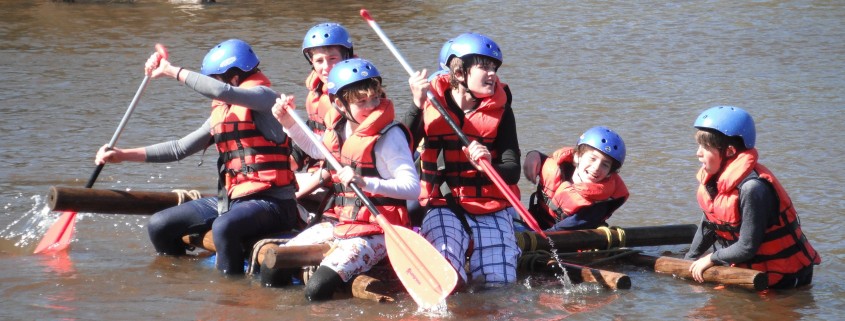Scope and Sequence of Outdoor Education in Australian Schools
OEA believes that all Australian children and Australian society benefit immensely from outdoor experiences.
It is important that children are introduced to the outdoors from a young age and as children’s abilities grow so to do the opportunities and learnings possible. To that end OEA supports a sequential Outdoor Education program, with outdoor recreation an essential component of a high quality Health and Physical Education program in all year levels. The following overview will assist teachers and parents understand the progression and importance of outdoor education and experinces for their children.
Early Years (typically 3–5 yrs of age)
Outdoor Education is integrated into early years education and may become increasingly important for urban students that may have restricted opportunities to spend time in nature.
Being outside, playing in dirt and/or sand, imaginative play with objects to hand such as sticks, leaves and trees are all part of exploration of the natural environment in these years, allowing them to develop a vocabulary of the places where they spend time.
Play that is not restrained by manufactured goods in a social context supports deep friendship and communication skills, as well as developing stronger intellect. Young children rely heavily on information provided by their senses and should be encouraged to do so in a range of natural areas such as parks, beaches, lakes and forests. They are exploring boundaries in their environment and are testing other peoples’ responses as they do so.
Adult responses to their actions are critical in shaping their approaches to adventure and nature. Facilitated outside play and exploration journeys are critical to developing connections with and care for nature. They are still in a stage where their ability to make good choices around water, heights and other natural hazards may not be well developed and requires education and constant supervision in and about these places.
They are beginning to develop foundational independence from parents and caregivers, and respond well to making decisions within boundaries. Regular and extended experiences in outside environments in all seasons encourage resilience and comfort in a range of weathers.
Foundation (typically 5–6 yrs of age)
Typically students at this age are curious about nature. They frequently notice small things outdoors that adults miss. This is the opportunity to encourage such curiosity and develop the initial skills and knowledge to safely develop this curiosity and lay a foundation for enjoyment of the out of doors and outdoor play. It is also important that students at this age learn the skills to assess and move on uneven and varied surfaces.
Fresh air and outdoor play alone and in groups are essential components of the child’s development. They require opportunities for facilitated free play in a range of environments including boulders, trees, grasslands, creeks, lakes and beaches as the local environment can provide. Movements such as climbing, tunnelling, swinging, rolling, jumping, rolling and throwing stones are essential for development of a physically capable child in the outdoors. The importance of taking simple measures to maximise enjoyment and safety in outdoor environments such as sunscreen and hat during summer provide foundational ideas that nature can be enjoyed safely.
Children begin to develop awareness and respect for other and require education as to the role and place of natural things. They may have fears about things in nature such as spiders, snakes and crocodiles and require re-assurance and education about these things. Education regarding exploration without leaving an impact on nature is important and they require education as to the role and place of nature, and empathy towards other living things.
Year 1–2 (typically 6–8 yrs of age)
As students develop their own identities and participate more broadly in everyday life their movement and recreation options can expand. Being introduced to the knowledge and skills to undertake outdoor activity in more natural settings, such as a day walk, fosters a beginning sense of a wider ecological world. They begin to recognise elements such as fresh air and the influence of naturalness on their emotional and physical well-being and responses. They begin to develop understanding of the importance of care for nature, and engagement in conservation activities can provide a sense of satisfaction when reflecting on their positive contribution to the natural environment.
Simple ecological principles through experiential learning stimulate curiosity to learn more about the interactions in nature, as well as the adaptations to local climates. They begin to understand the importance of care for each other in natural environments, and are provided foundational guidelines on how best to do so. They are introduced to open space as a place to support healthy lifestyles, and are further supported to engage in basic movement patterns in these areas.
Children are encouraged to develop their own minor games using creative play. They may be fearful of being away from the home environment at night time, and require carefully facilitated experiences that allow students to develop security sleeping away from home and managing night time fears.
Year 3–4 (typically 8–10 yrs of age)
As children begin to develop their comfort in outdoor environments, they can begin to explore a greater range of environments and spend longer without direct intervention on personal care from adults. They are provided with opportunities to learn about alternative cultural ways of knowing nature. First Australian perspectives of landscape (if not already part of the cultural setting) are introduced.
They begin to identify a range of outdoor activities that might take place in the outdoors for recreation and play, and identify foods that support healthy activity. Through extended time in they begin to develop greater self-reliance and stronger decision making regarding personal care.
Personal responsibilities within groups become increasingly evident through participation in group tasks that provide food, shelter, hygiene and other maintenance tasks. Experiences away from the home in these years can provide greater independence and knowledge of self. The importance of engaging in positive activities towards nature can be facilitated with increasing independence.
Year 5–6 (typically 10–12 yrs of age)
Students are introduced to outdoor recreation as part of an Australian way of life through stories and direct experience. At this age range students can begin to develop skills and knowledge to participate safely in outdoor recreation activity and understand how this contributes to their own health and well-being.
They begin to understand the importance of ecological well-being in fostering human well-being, and how they can contribute to this process. They begin to explore the impact of human activities on natural environments and strategies to minimise these impacts that include technological, structural, educational and individual behaviour initiatives.
Students can begin to take greater responsibility for their own well-being and participation in outdoor activities through packing their own kit for camp and making decisions about some aspects of programming. They can begin to take on minor leadership roles within the group in outdoor settings, and are provided opportunities for increased freedom within boundaries.
Year 7–8 (typically 12–14 yrs of age)
Students begin to develop skills and knowledge to undertake more extended journeys in natural environments, and begin to develop skills of interdependence within the group. They are able to develop higher levels of skill and have greater capacity for endurance.
Through lightweight expeditions they are able to develop greater responsibility for self, as well as immerse themselves in natural environments for longer. They begin to know accepted codes of practice for lightweight and other journeys in natural environments to minimise environmental impact and to respect other users of these environments. They begin to develop strategies to manage minor incidents in the outdoors and other places.
Through reflection and introspection they explore their place in the world and in nature, and what positive contributions they might make. Through short periods of reflective time in natural settings they develop greater knowledge of the role of nature in promoting well being and balance to western living.
They develop deeper knowledge of seasons, climate, growth and landscape and investigate adaptations in the Australian context. They begin to explore natural environments from a field naturalist perspective, and learning the role and place of different species in ecosystems.
Year 9–10 (typically 14–16 yrs of age)
In these years, students develop a deeper understanding and reasons for codes of conduct in outdoor recreation activities. They begin to explore more adventurous activities as a way of exploring self and nature, and the lessons that can be learned for everyday living. In these years students are increasingly required to assess and manage risk in both recreation and everyday lives.
Through engagement in more adventurous outdoor activity students can learn to gain skills for personal and group well-being and lay the foundation for ongoing healthy safe outdoor recreation participation. They are now capable of developing the knowledge and skills to prepare for and participate in an independent lightweight journey with adult guidance and supervision.
They can now assume leadership roles in group management during these journeys. They are able to assume increased responsibility for the nature and forms of such journeys, and have increased appreciation for the role of vistas and expanse in developing a sense of wonder for the natural world.
They begin to develop an understanding of the impact of decision making by administrative bodies and governments on natural environments through investigation of recent issues relating to conservation. Through conservation service students can develop increased sense of self-efficacy and citizenry towards the natural environment, and begin to develop their own ideas and strategies to support such efforts.
Senior secondary (typically 16–18 yrs of age)
In these years students are emerging into adulthood and seek to assume more adult roles, but may not be ready to begin to assume adult responsibilities. Outdoor Education can assist this transition to an active outdoors, environmentally responsible, empathetic citizen.
Students are ready to learn more technical skills of adventurous journeys, manage the risks effectively, and assume self-reliant leadership after demonstrating appropriate planning and preparation. They are ready to begin mentoring others in foundational activities, and to develop their own ideas for lifelong engagement in outdoor activities. They are able to critically reflect on such experiences, and envisage how they can embed ‘the outdoor life’ as part of their way of being.
They are able to develop higher order thinking with regards to decision making in the field and analysing such decisions. They are able to engage in higher-level critical thinking about political and sociological issues that support health and well being of individuals and the environment.
They are able to engage in more complex discussion of systems in nature and the relationship to environmental health and western lifestyles. They are able to construct reasoned arguments that demonstrate empathy for the often opposing and complex economic and social demands on areas of natural significance. They are able to generate ideas for alternative actions and are able to engage with community bodies that seek to support positive actions towards nature.




